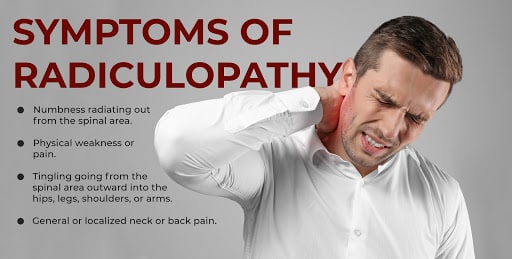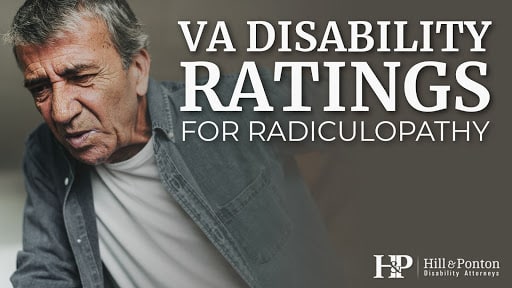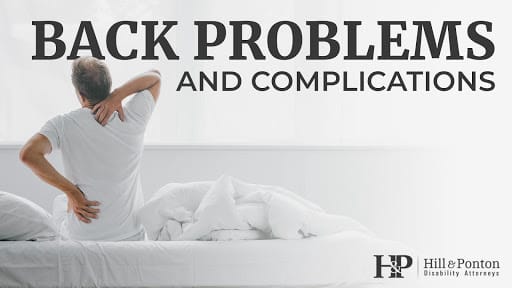Am I eligible for VA benefits due to Radiculopathy?
Radiculopathy, or a pinched nerve, can cause major discomfort and problems with a range of motion during everyday activities. If you experienced radiculopathy during military service, you may be eligible for VA benefits for your disability. This may also apply if you had existing radiculopathy that was made worse during your time in the service. Here, we discuss the process of proving service connection and obtaining a VA disability rating for radiculopathy.
What Is Radiculopathy?
Radiculopathy is a condition that occurs when the nerves in the spinal cord are damaged, irritated, or compressed.
The typical symptoms of a radicular condition depend on the location of the affected nerves. Common symptoms include:
- Numbness radiating from the spinal area
- Physical weakness or pain
- Tingling from the spinal area outward into the hips, legs, shoulders, or arms
- General or localized neck or back pain
- Muscle spasms

The nerves may be based in:
- The cervical spine, conveying sensation to the neck and arm muscles
- The thoracic or middle spine, conveying sensation to the chest, midsection, and ab muscles
- The lumbar (or lumbosacral) spine, conveying sensation through the lower back, glutes, hamstrings, and leg muscles
Service Connection for Radiculopathy
Most vets went through long periods of standing or marching, strenuous physical exercise challenges, and weapons training during military service. Therefore, a service connection for back trouble is not unusual. That said, veterans need to claim their back injury in a highly specific way.
It is possible to prove service-connection for radiculopathy. To succeed with this service-connection claim, a vet must show a current medical diagnosis of radiculopathy that is linked to the in-service occurrence of the radiculopathy, or an in-service incident that caused or aggravated the radiculopathy.
Examples of in-service incidents may include breaking or dislocating a vertebra or suffering physical back strain while training, operating a weapon, lifting equipment, jumping, or completing other military exercises. Veterans don’t necessarily need to trace their radiculopathy to one single active-duty incident.
Secondary Service Connection for Radiculopathy
Veterans may be able to claim not only service-connected disability benefits but also secondary service-connection that the Department of Veterans Affairs might have missed. Additionally, a secondary disability claim can increase your benefits if a new condition arises from your current service-connected disability. You may, for example, have developed radiculopathy that stems from a back strain or a back injury you suffered during military service. Often we have clients with 20% ratings for back disabilities who could qualify for higher ratings for their serious impairments.

Radiculopathy in arms, buttocks or lower extremities can be secondary to several underlying physical conditions, such as:
- Back strain or spinal injury
- Degenerative arthritis
- Herniated discs
- Spinal stenosis
- Degenerative disc disease (DDD)
Because it is related to and accompanies numerous other back issues, radiculopathy is frequently claimed as a veteran’s disability that is secondary to other back conditions or back pain.
Developed new symptoms? Let us know. Perhaps you had no secondary conditions when you first filed your claim, but a condition showed up later. You can file a new, secondary service-connection.
Service Connection by Aggravation: What If You Were Diagnosed With Radiculopathy Before Service?
What is service connection through aggravation, and can it apply to radiculopathy? Perhaps you already had a health condition when entering the Army, Navy, or Air Force, and it was aggravated during your active duty service. The VA may award service-connected disability benefits for conditions that arose before the time of active duty but worsened during it.
Under federal law, a preexisting condition is presumed “aggravated” if that condition:
- Was noted in the service person’s entrance examination
- Got worse during the person’s time of service, as shown by medical records such as a comparison of reports on the veteran’s disability before and during, or soon after, service
- Worsened more in service than it would have worsened outside of service
- Worsened permanently
A veteran need not show that a certain incident during service aggravated the disability—only that it became worse during service.
Compensation & Pension (C&P) Exams for Radiculopathy
The VA commonly requires C&P exams to rate disability and determine the connection to service. The examiners report to the VA Regional Office (RO), where the decision is made.
Vets who receive a mailed notice should attend the exam to avoid a claim being denied. The vet may be accompanied by a witness, and they may bring notes about their symptoms and experiences into the exam room. Counsel can be very helpful for a successful C&P exam, and the right preparation can be the difference between an approval or denial.

Increasingly, the examiners use Disability Benefits Questionnaires, which independent medical experts can also fill out. If the veteran’s doctor has provided a favorable opinion on the claim, the vet can submit this supportive evidence in the C&P exam.
After an exam, vets and witnesses should promptly memorialize their experience, and date their notes. Was the veteran able to go through and explain all the important points about symptoms and experiences? Thorough note-taking after the exam can be helpful if the vet’s representative needs to persuade the VA to overturn a problematic decision on the C&P exam. The VA can order a clarification from the examiner, or even order a new exam with a different examiner.
Evidence for Radiculopathy Claims and Appealing under the AMA system
For radiculopathy, relevant evidence relates to any element of the veteran’s claim. This includes both medical evidence and lay evidence. A medical record can show a doctor’s diagnosis of radiculopathy or another service-connected condition. Other key evidence may include a medical expert’s professional opinion that the service-connected condition (low back strain, for example) caused the radiculopathy—thus indicating a secondary service-connected disability. Medical images like x-rays can also be useful.
Lay evidence can include the veteran’s own statements, as well as statements from family members, attesting to the frequency of flare-ups, daily challenges, measures needed to manage the symptoms, loss of sleep, loss of alertness, etc.
The Appeals Modernization Act (AMA) regulates appeals for denials. The AMA has been the VA’s appeal system since 2019. New and relevant evidence can be used not only in filing a claim, but also to appeal a negative decision, or to reopen an old claim. Once the regional office (RO) issues its determination, the veteran has a year to file an appeal. Otherwise, the denial stands.
What Is the VA Disability Rating for Radiculopathy?

A doctor’s physical exam and electromyogram (EMG) that confirms a radicular condition serve as bases for ratings. The VA uses a general rating formula called the Veterans Affairs Schedule for Rating Disabilities to determine the specific percent rating. The degree of severity, represented by a percentage, corresponds to the monthly compensation a vet receives. Keep in mind that a VA rating for radiculopathy is normally determined as a secondary condition, contingent on another spinal disability. See the above section Secondary Service Connection for Radiculopathy. You can also the VA index using the words radiculopathy and ratings to find a current set of decisions on this question as they relate to your specific condition.
Radiculopathy does involve a condition of the spinal nerve, and for a specific rating for a nerve condition the determination is based on (a) paralysis, meaning that the nerve has no ability to function; (b) neuritis, meaning that the nerve is irritated, and there is numbness, muscle atrophy, or loss of reflexes; or (c) neuralgia, meaning that the nerve produces intermittent or continual pain, possibly accompanied by numbness and tingling. In moderate neuralgia, typical of a radiculopathy diagnosis, a veteran experiences numbness, and tingling, and moderate to severe pain. In mild cases, symptoms but not significant impairments exist. Rating nerve conditions also involves identifying the nerve involved.
For sciatica, for example, in radiculopathy of the lower back, the VA applies rating criteria specific to the sciatic nerve (diagnostic code 8720), and assigns a disability percent rating on whether the neuralgia is moderate or mild. If a nerve condition affects both sides of the body (such as both pairs of arms or legs), the VA should issue a rating for each side and an additional bilateral factor.
Contact Us For Help
We offer this information to our readers as general information only. To discuss your own case, contact us for an initial case evaluation at no charge to you. Whether you are filing a new claim or dealing with a denied claim, the highly experienced staff at Hill and Ponton is here to advise, support, and represent you.


